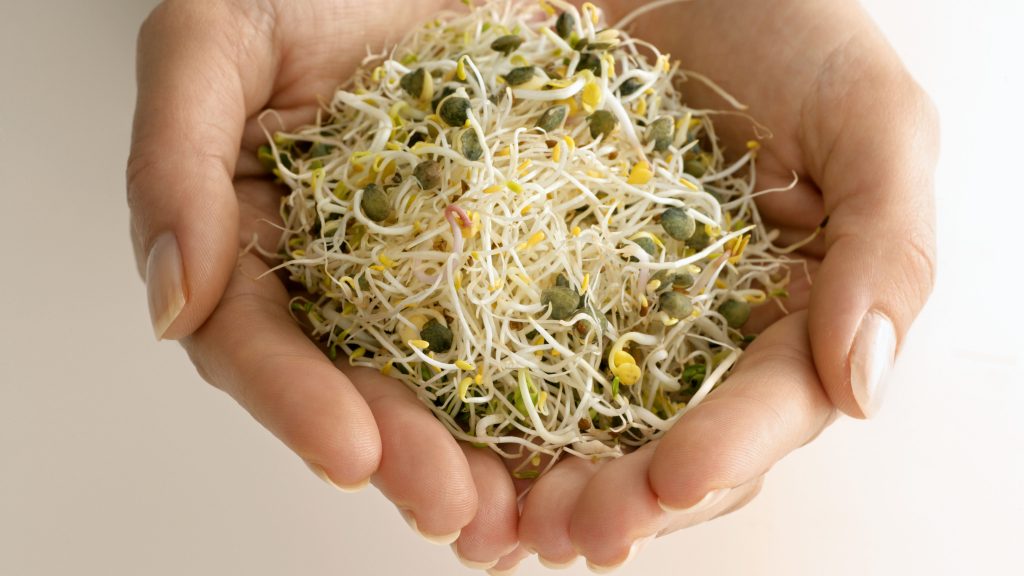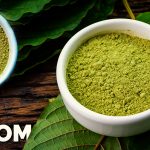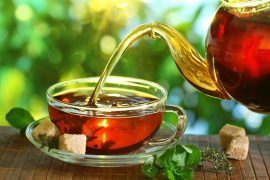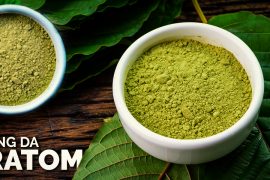Alfalfa has been used as a medicinal plant for at least 4000 years and is still popular today. It’s been a valued herb in both Indian and Chinese medicine for millennia. Why is it so enduring? Keep reading to learn what the buzz is about.
What is Alfalfa?
Alfalfa (Medicago sativa) is the most commonly grown legume in the entire world. It originated in Asia, but today the U.S. is the largest producer. Its title is rooted in an Arabic phrase meaning that the “father of all foods” and its original use spans thousands of years.
Alfalfa is now all the buzz among health-conscious customers today. You’ll barely find a health food shop without alfalfa sprouts or powder. However, you might be amazed to hear that the majority of generated alfalfa goes to the food sector, which uses it as animal feed.

Before it made its way into Western food shops and farms, alfalfa was utilized for a long list of health disorders from the East. Traditionally, it is thought to be a remedy for improving memory, breastfeeding, kidney problems, and arthritis. It’s a valued herb in traditional Chinese medicine (TCM) and traditional Indian medicine (Ayurveda).
Antioxidants & Nutrients
Besides being a great source of Vitamin K, alfalfa is also full of phytonutrients. The antioxidants in alfalfa come in Various varieties and comprise:
- Flavonoids: quercetin, myricetin, luteolin, apigenin
- Phenolic acids: coumaric acid, ferulic acid, uric acid, caffeic acid
- Phytoestrogens: coumestrol, formononetin, daidzein
The importance of antioxidants for health can hardly be overstated. Systemic inflammation and oxidative stress are involved in virtually every chronic illness. The polyphenols in alfalfa and other foods might assist by countering inflammation and free radical harm.
In both cell and rat studies, alfalfa reduced markers of oxidative stress. It decreased free radical production, restricted DNA damage and fostered the antioxidant glutathione. It also protected the liver from damage.
Alfalfa extract has revealed brain-protective effects in rats. The infusion restricted brain cell death because of a lack of oxygen (hypoxia). It also fostered antioxidants inside cells, such as glutathione and superoxide dismutase (SOD).
Sprouts Nutrition
100 grams (3 cups) of raw alfalfa sprouts supplies:
- 23 calories
- 4 g of protein
- 0.7 g of fat
- 2.1 g of carbohydrates
- 1.9 grams of fiber
The sprouts are about 93% water, which explains their low calorie and macronutrient count.
Alfalfa Is a Great source of the following minerals and vitamins (per 100 g):
- Vitamin K: 30% RDA (30.5 mcg)
- Vitamin C: 9 percent RDA (8.2 milligrams )
- Folate: 9 percent RDA (36 mcg)
Alfalfa also contains traces of calcium, magnesium, potassium, potassium, iron, zinc, copper and manganese.
Snapshot
Proponents:
- Lowers cholesterol
- reduces symptoms of menopause
- Rich in nutrition
- May improve diabetes
- May lower inflammation
- May protect the heart
Skeptics:
- Few human studies
- Seeds may be contaminated
- Medication interactions are potential
- May cause or worsen autoimmunity (infrequent )
- Unsafe in pregnancy
- Includes lectins and other antinutrients
Possible Benefits of Alfalfa
Alfalfa Is considered safe to consume food, but nutritional supplements have not been approved by the FDA for clinical use and generally lack strong clinical research. Regulations set manufacturing standards for them but do not ensure that they are effective or safe. Speak with your physician before supplementing.
Insufficient Evidence For
The Following purported gains are just supported by restricted, low carb clinical studies. There’s inadequate evidence to support the use of alfalfa for some of the below-listed uses. Don’t forget to talk with a doctor prior to using alfalfa for health reasons, rather than use it in place of something your physician recommends or prescribes.
1) Cholesterol
In a clinical trial of 15 people with high blood fat levels, alfalfa seeds decreased both overall and LDL cholesterol. The seeds also decreased apolipoprotein B, a marker of heart disease. A high dose utilized: 40 grams of alfalfa seeds 3 times daily for 8 weeks.
In A pilot trial, alfalfa seeds decreased total cholesterol levels in the blood. The seeds also reduced the absorption of cholesterol and increased bile acid elimination with the stool. It’s difficult to draw conclusions from this study; it’s more than 3 decades old, included just 3 volunteers, and lasted 3 weeks.
Two Rat studies affirmed that alfalfa reduces the absorption of cholesterol from food. But if compounds known as saponins were removed, cholesterol absorption moved straight back to usual. Therefore, these saponins are likely responsible for their cholesterol-lowering effect.
Alfalfa Saponins also decreased cholesterol absorption. They reduced total cholesterol levels in the blood and increased the good (HDL) to bad (LDL) cholesterol ratio.
2) Menopause
In one clinical trial, a blend of alfalfa and sage reduced hot flashes and night sweats in 30 menopausal women.
The favorable impact on menopausal symptoms is generally attributed to phytoestrogens. There are 3 main Kinds of phytoestrogens:
- Isoflavones (e.g. genistein, daidzein, formononetin)
- Coumestans (e.g. coumestrol)
- Lignans
Alfalfa Is a rich source of the second category (coumestrol). It also contains phytoestrogens in the first group. According to numerous epidemiological studies, phytoestrogens improve symptoms of menopause by mimicking the effects of estrogen.
1 cell study demonstrated alfalfa’s estrogenic effects and its ability to target nitric oxide.
Animal & Cell Research (Lacking Evidence)
No Clinical evidence supports the use of alfalfa for some of the conditions listed in this section. Below is a list of the existing creature and cell-based research, which ought to guide additional investigational efforts. On the other hand, the research listed below should not be interpreted as supportive of any health advantage.
3) Diabetes
Alfalfa Is traditionally regarded as an anti-diabetic plant, and there is some research to back this up. In diabetic rats, alfalfa water infusion significantly reduced blood sugar. It also reduced LDL cholesterol and triglycerides. The extract also countered liver damage and reduced the liver enzymes ALT and AST.
In a mouse study, adding alfalfa into the animals’ diet lowered blood glucose. The water infusion raised insulin release. Interestingly, it raised sugar too, somewhat mimicking the action of insulin. This may be useful for some type 1 diabetics and people with advanced type 2 diabetes.
4) Infection
Lipopolysaccharide (LPS) is a toxin made by Gram-negative bacteria (such as E. Coli) which causes inflammation. In individuals with leaky gut, This toxin can cross in the bloodstream. In both test tubes and mice, alfalfa extracts reduced inflammation induced by LPS. They reduced several markers of inflammation (like NF-kB, IL-1, IL-6, and TNF-alpha).
A Compound belonging to the isoflavone family, biochanin, may carry the anti-inflammatory effect. In three cell studies, biochanin inhibited NF-kB along with other inflammatory pathways.
LPS Strongly contributes to autoimmune arthritis. As previously mentioned, LPS can migrate from the gut to the bloodstream. There it exfoliates the body for an autoimmune inflammatory reaction, which can make moderate symptoms become full-blown disease. Because alfalfa reduces inflammation in LPS, it might be helpful for leaky gut and arthritis. But, clinical trials to confirm that are missing.
5) Heart Health
High Cholesterol may cause arteries to harden and clog. As discussed, alfalfa can lower cholesterol levels. A couple of animal studies have verified that alfalfa really prevents clogged arteries when in animals that consume a lot of cholesterol.
Furthermore, flavonoid antioxidants in alfalfa may protect the heart :
- Lowering cholesterol and blood pressure
- Enhancing the flexibility of blood vessels
- Countering systemic inflammation and oxidative stress
One Tests concluded that for every 100 mg of flavonoids a person eats, their risk of stroke may drop by as much as 9 percent. It is uncertain to what extent the particular flavonoids in antioxidants may be helpful for this purpose.
Alfalfa Side Effects & Precautions
Alfalfa is “generally recognized as safe” (GRAS) by the FDA. However, certain people may want to avert it for various reasons. To Prevent adverse effects or unexpected interactions, talk to your health care provider before using alfalfa for health functions or making significant changes to your diet plan.
Pregnancy & Nursing
Alfalfa Is potentially dangerous during pregnancy, as it may stimulate the uterus. No data exists on the security of alfalfa in nursing. Because we do not know which byproducts of alfalfa are passed on to the baby through breast milk, nursing women should avoid it.
Autoimmune Disorders
Alfalfa may be an immune stimulant. It should be avoided if you have an autoimmune disease or a family history of autoimmune disorders.
Even More worryingly, alfalfa has been reported to trigger (or reactivate) Lupus in a few rare circumstances. It’s suspected that the amino acid l-canavanine is your trigger since it’s toxic to animals. L-canavanine is mainly present in the seeds of alfalfa.
Bacterial Contamination
Alfalfa Seeds are occasionally infected with bacteria. There have been a number of cases of people becoming sick after eating raw alfalfa sprouts. Because of this, anyone using a poorer immune system should avoid them — such as children, the elderly, and people taking immune-suppressing medications.
Sunlight Sensitivity
In Certain instances, creatures developed the sensitivity to sunlight after being fed alfalfa. Compounds called coumarins, which can be found in alfalfa, are known to make it.
We Do not know if alfalfa contains enough of these chemicals to cause sunlight sensitivity in people, but it’s something to be watching for if you are carrying alfalfa supplements.
Pesticides
As With all non-organic crops, pesticide levels in alfalfa are a concern. U.S. farmers traditionally utilized compost such as 2,4-DB and paraquat on alfalfa, but are increasingly changing to glyphosate. This is due to the introduction of genetically modified, herbicide-tolerant seeds. Search for organic alfalfa if you would like to avoid these pesticides.
Lectins
Alfalfa Is a legume and contains lectins, which are primarily concentrated in the seeds. Normally, sprouting seeds helps break down lectins. However, in the case of alfalfa, it sounds sprouting actually raises the lectin content. Alfalfa contains additional antinutrients too. In case you have food sensitivities and/or autoimmune problems, you may be better off preventing alfalfa.
Drug Interactions
Alfalfa might interact with certain drugs. These include:
- Warfarin. Alfalfa contains high amounts of vitamin K, which aids in blood flow. Individuals taking blood thinners should prevent it.
- Contraceptive pills & estrogen. Alfalfa contains phytoestrogens that may interfere with the estrogen in these types of medicines.
- Medicines that increase sunlight sensitivity. Alfalfa may increase sensitivity to the sun. Be careful if you take any medicines that boost sunlight sensitivity.
- Immunosuppressants. Alfalfa stimulates the immune system. Avoid it if you’re on medications to suppress your immune system.
Limitations and Caveats
Few Human studies on alfalfa exist, the majority of which are low-quality. A higher level of evidence supports its advantages for reducing cholesterol and alleviate menopausal symptoms.
In animal research, alfalfa improved Diabetes, diminished inflammation and protected the heart, but these findings may not translate to people.
Growing Alfalfa Sprouts vs Supplements
Grow Your Own Sprouts
You Can easily increase your own alfalfa sprouts at home. All you will need is some alfalfa seeds, water, a jar, and a breathable lid to pay it. The lid can be from gauze, cheesecloth, a pantyhose or a screw-on lid. Follow these steps:
- Put 1-2 tablespoons alfalfa seeds in a jar and cover with about an inch of water
- Cover with a breathable lid and soak overnight (8-12 hours)
- Drain and rinse thoroughly
- Proceed to rinse 2-3 times daily
- About the 3rd day, move the jar to a location with indirect sun
- Continue to wash 2-3 times per day
- On the 6th day, the carrots should prepare
Supplements
Various Alfalfa supplements can also be available, in case you’re not a fan of sprouting or would prefer to acquire a consistent daily dose. Some of them include:
- Raw alfalfa herb
- Cut alfalfa leaves
- Powdered alfalfa leaves or juice
- Alfalfa liquid extracts
- Alfalfa pills and capsules
How Much to Take
There Is no safe and effective dose of alfalfa or its extracts since no sufficiently powered study was conducted to locate one. For lowering of cholesterol, a very high dose of 120 g/day of heat-treated alfalfa seeds as being used, split up into 3 doses over the day.
The British Herbal Medical Association urges:
- Dried aerial parts (i.e. leaves/whole pill ): 5-10 grams, 3 times daily
- Infusion: 5-10 g, 3 times daily
- Liquid extracts: 5-10 grams, 3 times per day
Alfalfa Honey
Alfalfa honey Is less sweet than many others. It’s a delicate, gentle, and pleasantly sweet taste. It’s high in sugar, which makes it crystalize faster than honey types that are higher in fructose.
Raw, unprocessed honey is naturally antiseptic and antibacterial.
Alfalfa honey is prebiotic, meaning it may encourage the growth of beneficial gut bacteria. In 1 study, alfalfa honey enhanced the development of five human Bifidobacterium species, including B. longum, B. adolescentis, B. breve, B. bifidum, along with B. infantis.
Alfalfa Honey retains many of the antioxidant compounds from the plant. However, this is how it is with many other honey types. Alfalfa honey probably offers similar advantages, but it’s not likely to be superior.
The precise active chemicals in alfalfa honey may be different from one maker and geographical location to another.
One Analysis compared alfalfa and clover honey: clover had 19 antioxidant phenolic compounds, while alfalfa had only 14. Just clover honey contained genistein, quercetin, and caffeic acid. Others, such as daidzin, were around ten times longer concentrated in clover honey. Gallic acid has been found in only alfalfa honey rather than in clover [53].
Takeaway
Alfalfa Is an ancient herb that has been used medicinally for millennia. It is a rich source of vitamin K, flavonoids, and phytoestrogens. It is most often utilized to reduce cholesterol and blood sugar, fight oxidative stress, and ease menopausal symptoms.
Using alfalfa Isn’t entirely Risk-free, as the herb has strong immune-stimulant potential. The seeds contain lectins and may be contaminated with bacteria. Always heat the Seeds use, or avoid them completely. Alfalfa shouldn’t be Utilized in Pregnant or breastfeeding women. Also, avoid it if you suffer from an Autoimmune disorder or take prescription drugs.







Comments are closed.